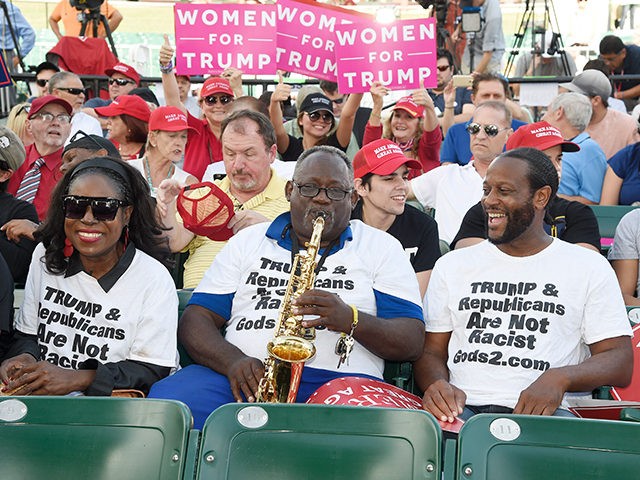Democrats must block President Donald Trump from using his pro-American immigration policy to win more African-American voters, says New York Times columnist Charles Blow.
“I believe that Trump’s team, if not him, understands the fissures in this immigration debate and is using them,” Blow wrote April 10. He continued:
As Trump said in January in an Oval Office address after shutting the government down because Congress wouldn’t fund the construction of his wall: “All Americans are hurt by uncontrolled illegal migration. It strains public resources and drives down jobs and wages. Among those hardest hit are African-Americans and Hispanic Americans.”
That is a pitch to both blacks and Hispanics already in this country. There is a real cleavage between second-, third- and fourth-generation Hispanics and new arrivals.
…
A Quinnipiac University poll last year found that 54 percent of blacks and 55 percent of Hispanics thought immigrants’ illegal crossing of the border with Mexico was an important problem. Additionally, 31 percent of blacks and 40 percent of Hispanics believed in using the National Guard to patrol the border with Mexico, and 13 percent of blacks and 25 percent of Hispanics supported the building of Trump’s wall.
In 2016, Trump won the votes of roughly one-in-eight black men and one-in-three Hispanic men, while getting lower support from black and Hispanic women. Some of this sexual disparity exists because of Trump’s “Hire American” economic and immigration policy, which appeals mostly to male voters because it pressures companies to hire Americans at decent wages.
That small level of black electoral support allowed Trump to win the 2016 election — but it may rise before the 2020 election despite Democrats’ loud charges of racism.
In 2018, wages for blue-collar Americans jumped by 4 percent partly because of Trump’s “Hire American” policy.
Studies show that Trump’s green-colored pocketbook politics can be more important for blue-collar blacks than the Democrats’ race and resentment policies, which appeal more to white-collar blacks, such as Blow. In 2006, author Tatishe Nteta wrote in American Political Research journal:
Measures of economic self-interest more strongly account [than estimated collective-interest] for the opinion of African American members of the working class when compared to their middle-class brethren … [and] it appears that class membership is a more powerful force in shaping the attitudes of Blacks in comparison to Whites …
For African Americans who lost a job to an immigrant, working-class membership resulted in a 13 percentage point increase in the probability of support for an increased federal role in workplace oversight [againt employment of illegal immigrants] when compared to middle-class African Americans who experienced a similar loss.
The political result is that:
Working-class African Americans are significantly more supportive of policies that seek to: decrease the number of immigrants coming to the United States, increase the federal role in verifying the employment status of immigrants, and attempts to amend the Constitution’s citizenship provisions.
The enforcement of immigration law is also helping blacks — and Hispanics — get better-paid jobs.
Interesting test case for economics of blue-collar immigration: Lower-status Americans get hired at higher wages at Cloverhill bakery in Chicago after illegals are fired, but high-status progressives don't care b/c they prefer more migration. https://t.co/0qokfiGwKj
— Neil Munro (@NeilMunroDC) February 19, 2018
Each year, roughly four million young Americans join the workforce after graduating from high school or university.
But the federal government then imports roughly 1.1 million legal immigrants, refreshes a resident population of roughly 1.5 million white-collar guest workers plus roughly 500,000 blue-collar visa workers, and also tolerates about eight million illegal workers.
This federal policy of flooding the market with cheap white-collar graduates and blue-collar foreign labor is intended to boost economic growth for investors.
This policy works by shifting enormous wealth from young employees towards older investors, even as it also widens wealth gaps, reduces high-tech investment, increases state and local tax burdens, hurts children’s schools and college education, pushes Americans away from high-tech careers, and sidelines millions of marginalized Americans, including many who are now struggling with fentanyl addictions.

COMMENTS
Please let us know if you're having issues with commenting.